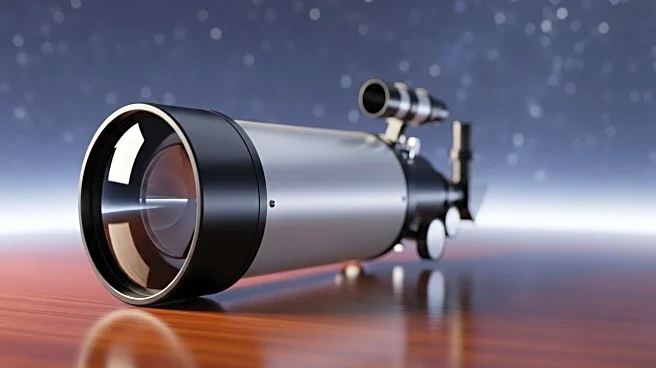What's Happening?
Amazon Prime Day in October is presenting significant discounts on telescopes, catering to both novice and experienced astronomers. Among the deals is the Unistellar Odyssey Pro, a smart telescope known for its ability to combat light pollution, now available for $4,049, down from $4,499. This telescope is praised for its deep space observation capabilities and lightweight design, making it ideal for travel to dark sky sites. Other notable deals include the Celestron Travel Scope 70, reduced to $80 from $120, and the Celestron AstroMaster 130EQ, now $252 from $360. These telescopes offer various features suitable for planetary viewing and deep space exploration, providing users with enhanced views of celestial objects.
Why It's Important?
The availability of discounted telescopes during Prime Day is significant for astronomy enthusiasts and educators, as it makes high-quality equipment more accessible. This can encourage more people to engage in stargazing and astrophotography, potentially increasing interest in astronomy and science education. The reduced prices also benefit those looking to upgrade their equipment without incurring high costs, supporting the growth of amateur astronomy communities. Additionally, the focus on smart telescopes like the Unistellar Odyssey Pro highlights advancements in technology that make observing the night sky easier and more rewarding.
What's Next?
As Prime Day concludes, consumers are likely to see a return to regular pricing for these telescopes. However, the increased interest and sales during the event may prompt retailers to offer similar discounts in future sales events. Astronomy clubs and educational institutions might leverage these deals to expand their equipment inventory, enhancing their programs and outreach efforts. The popularity of smart telescopes could drive further innovation in the field, leading to more user-friendly and technologically advanced products.
Beyond the Headlines
The trend towards smart telescopes reflects a broader shift in consumer technology, where ease of use and integration with digital devices are increasingly prioritized. This could lead to a democratization of astronomy, where more individuals can participate without needing extensive technical knowledge. The environmental impact of increased stargazing activity, such as light pollution awareness, might also gain traction, encouraging communities to adopt practices that preserve dark skies.










